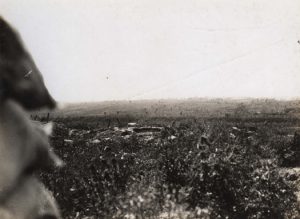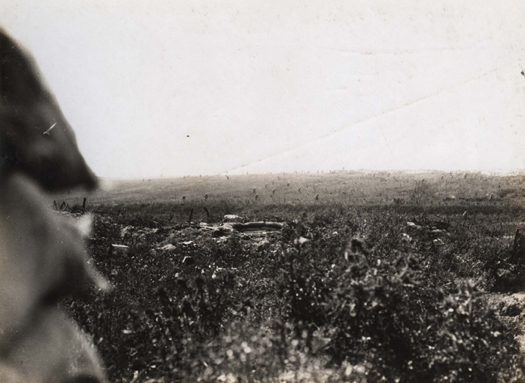
While much has been written about the first day of the Battle of the Somme (July 1, 1916) when there were 19,240 British soldiers killed, the appalling loss of life continued for the remainder of the month. By the end of July there had been 158, 786 British casualties, 49,859 French and 103.000 German. It was, perhaps unsurprisingly, the worst month of the war as far as Cranleigh were concerned. Twenty Old Cranleighans died in July, more than 10% of the total lost in the conflict overall; all but one of those fell in France.
Three perished on the first day. Sergeant Leo Last (House 1916) fell in the initial assault; his regiment, the 19th Middlesex, the The Public Schools Battalion, “advanced into withering German machine gun fire. A few men reached the German barbed wire but got no further. Most were cut down or trapped in no man’s land. After nightfall those that were pinned down near the German wire were rounded up and made prisoners of war. The Public Schools Battalion suffered 522 casualties on 1 July, 22 officers and 500 other ranks.” It was Last’s 20th birthday.
2nd Lt Walter Woodstock (2&3 South 1902) of the 8th battalion York and Lancaster Regiment was in all likelihood mown day within seconds of going over the parapet. “Immediately after leaving their trenches the battalion came under heavy machine gun fire and most of the men were killed or wounded. The remainder carried on and took the enemy front line trenches and about 70 men eventually reached as far as the third line of German trenches, but only one man returned from there. What was left of the battalion remained fighting in the first line of trenches until overwhelmed. The Regiment took 680 men and 23 officers over the parapet, all the officers were either killed or wounded and of the battalion only 68 returned.”
2nd Lt Arthur Eames (2 North 1911) of the 1st battalion East Yorkshires died while leading a small party to try to flush out some Germans in an adjoining trench. The regimental diary states: “A superior number of Germans was encountered and it was while dealing with this situation that Lt Eames was killed.” He had been wounded in early June and had only just returned to his regiment.
On July 2 Major Robert Raper (House 1887) of the 8th battalion South Staffordshire Regiment died during an assault on Fricourt. He successfully led a patrol to clear the dugouts in the German front line and pressed on across no-man’s land. Raper was leading the two forward companies and succeeded in taking the final objective of Lozenge Alley under heavy fire but was killed in doing so. Later his body was brought back by a friend and buried south west of Fricourt. The villagers named a road in his honour after the war.
On July 3 Major Lascelles Barnett (2&3 South 1896) was killed during an early-morning assault on Ovillers by the Queen’s Own (Royal West Kent Regiment). He had served with the regiment for 11 years before moving to Canada where he became a rancher. When war broke out, he joined a Canadian regiment before switching on arrival in England. On the same day 2nd Lt Thomas Beven (East 1914) perished in an assault on German trenches near Authuille by the 2nd battalion of the South Lancashire Regiment. It suffered heavy losses and failed to reach their objective. Bevan was 19 and had left Cranleigh in December 1914.
On July 5 Captain Herbert Carpenter (East 1901) of the Duke of Wellington’s (West Riding Regiment) died during an assault on German lines. That evening 2nd Lt Harold Pither (1&4 South 1903) of the Royal Dublin Fusiliers was wounded when taking part in a raiding party. He was captured by the Germans but died of his injuries the next day.
On July 7 Lt Neil Crawhall (House 1904) of the 2nd Bn. East Lancashire Regiment fell during an attack on capture Bailiff Wood. His brother, Fritz, had been killed 15 months earlier.
On July 9 Lt Harold Jaye (2&3 South 1905) of the West Yorkshire Regiment (Prince of Wales’s Own) died in a field hospital from injuries sustained four days earlier. He had been in France six weeks. On July 10 Lt Frederick Dunn (1 North 1910) of the Lancashire Fusiliers was shot through the head. His commanding offer wrote to his parents that “your son was killed in action whilst gallantly organising the defence of one of our advanced trenches, which was being attacked by the Huns”.
On July 14 Captain Joe James (East 1890) of the Royal Berkshire Regiment died at Bologne while waiting to be repatriated on a hospital ship. He had sustained serious wounds on July 3. He was 40 years old and was a veteran of the Boer War (1899-1902) where he had won the Queen’s and King’s medals.
On July 20 2nd Lt Arthur Lord (West 1913) of the Royal Welsh Fusiliers died in an attack on High Wood. The assault was later written up by Robert Graves, of the same regiment, in Goodbye To All That. Graves was badly wounded in the same attack.
On July 22 Captain Alex Loch (2&3 South 1907) of the South Wales Borderers was killed in a late-night attack along the length of the Fourth Army front that completely failed.
On July 23 2nd Lt Francis Mott (West 1912) of the Royal Fusiliers died of wounds received a week earlier. Private Samuel Platt (1&4 South 1900) also lost his life that day. “A and B companies of the 14th Royal Warwickshire attacked on the left, but were met with a fire of such violence that Colonel Murray at once formed the opinion that nothing could live against it. The attacking companies were immediately cut to pieces, and those few who got within distance were met by a regular curtain-fire of bombs.”
On July 27 Sergeant Leonard Iceton (2 North 1908) of the Seaforth Highlanders died in fighting near High Wood. His colonel wrote: “He lived as he has died, a brave man and a gallant soldier, ever at his post.”
On July 29 Private Randolph Loibl (West 1911) of the Royal Fusiliers died of his wounds after being hit by shrapnel while waiting to go into the front line. A farm labourer in Canada at the outbreak of war, he immediately enlisted and reached the front in November 1915.
On July 30 Private Chas Norris (East 1902) of the Rifle Brigade was killed by an accidental explosion at a bombing school behind the front lines. He had been rejected for the army five times before finally being admitted in 1915.

